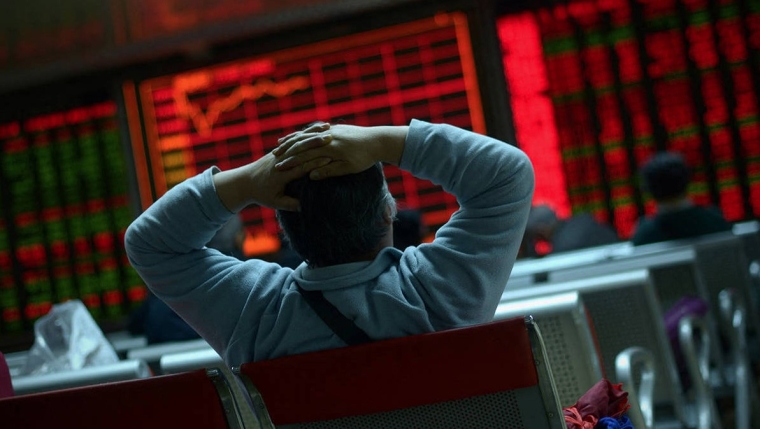
For decades, China set a shining example of how to capitalise on globalisation to accelerate domestic economic growth and development. These days, however, the country risks becoming a cautionary tale about mishandling globalisation’s shift from a beneficial tailwind to a disruptive headwind.
Although the Chinese economy’s recent travails have some unique characteristics, they illustrate the growth challenges facing many developed and developing countries. They also show that while economic growth is not everything, you cannot solve much of anything without it.
This year was supposed to mark a robust economic recovery for China. Instead, many analysts have been forced in recent days to again revise down their projections for Chinese growth, and more are likely to follow suit. This increasingly pessimistic outlook can be attributed to three main factors.
First, as the most recent trade data show, the global economy no longer supports China’s domestic growth dynamics. In June, Chinese exports fell by 12.4% (in dollar terms), and imports declined by 6.8%, far worse than the consensus forecast of a 10% decline in exports and a 4.1% decrease in imports. These disappointing figures are the result of sluggish demand growth in Europe and elsewhere, and enhanced restrictions against China, particularly those imposed by the United States, which created a self-reinforcing cycle that further dampened the country’s growth prospects.
Second, the Chinese authorities appear to be torn between two distinct approaches to stimulating the economy, resulting in a rather indecisive policy response. While the government seems inclined to revert to the top-down stimulus measures it employed in the past, actual implementation has been limited, owing to concerns about exacerbating inefficiencies and impeding the ongoing and generally orderly deflation of debt bubbles in certain sectors. Conversely, the much-needed alternative of unleashing bottom-up economic dynamism is constrained by domestic political considerations, leaving China stuck in the muddled middle. Meanwhile, domestic policy challenges are compounded by structural factors, including the aging population, high youth unemployment, and remaining pockets of excessive leverage.
Third, the removal of the long-standing zero-COVID restrictions has not led to a uniform sharp increase in household, business, and property demand. Instead, the process has been uneven and weaker than consensus forecasts. While GDP bounced back by 6.3% in the second quarter, growth fell short of the 7.1% pace that analysts expected.
Given that growth in Europe and the US is likely to remain subdued for the foreseeable future, and with the global economy still reeling from the impact of the most aggressive wave of interest-rate hikes by central banks in advanced economies in several decades, China cannot count on globalisation to rescue its faltering growth model. As companies seek to diversify supply chains away from China, inflows of foreign direct investment have also been constrained. Moreover, geopolitically-driven trade and investment restrictions are more likely to increase in response to US national-security concerns.
Rather than seeking salvation from external demand, China needs to sharpen its focus on domestic sources of robust and sustainable economic growth. Here, policy implementation has lagged, failing to match political leaders’ rhetoric. Similarly, the country’s industrial-policy framework has yet to strike the right balance between macro-level directives and providing sufficient operational autonomy at the micro level.
To avoid the middle-income trap that has repeatedly ensnared emerging economies, China must avoid policy inconsistency. That said, and with only a small handful of exceptions, it is difficult to point to any sizable economy that has managed to evade this trap over the past few decades.
While China represents a special example of “muddled-middle” growth strategies, it is not the only country in danger of falling into a growth trap. Both developed and developing countries face a similar risk of economic stagnation or, worse, regression.
With the exception of the US, few systemically important economies have recognised the significance of comprehensively reinvigorating their growth strategies. And even in the US, where recent government actions have focused on generating higher and more sustainable growth, the process is still susceptible to disruption by another Federal Reserve policy error.
Over the past two years, Gordon Brown, Michael Spence, Reid Lidow, and I have been discussing strategies that would enable governments to deliver the inclusive, durable, and sustainable growth needed to meet their citizens’ needs and aspirations. The results of these deliberations are outlined in our forthcoming book Permacrisis: A Plan to Fix a Fractured World, which will be published in September.
Our vision is simple. By adopting a “reduced form” approach, we have identified a manageable set of actions focused on three key areas: reengineering stagnant and increasingly ineffective growth models, improving domestic economic management, and enhancing global policy coordination and responses. We firmly believe that a detailed set of realistic and actionable measures could reverse worrisome secular developments, including declining growth and productivity, rising inequality, and heightened financial fragility.
Our findings could apply not only to China and other developing countries, but also to the world’s major developed countries, whose domestic malaise and weak global engagement undermine their economic and social well-being and the stability of the international system. Despite the policy mistakes that have put our world on its current course, we now have an opportunity to heed the lessons of the past and present and chart a more promising path for future generations.
Mohamed A. El-Erian, President of Queens’ College at the University of Cambridge, is a professor at the Wharton School of the University of Pennsylvania and the author of The Only Game in Town: Central Banks, Instability, and Avoiding the Next Collapse (Random House, 2016). Copyright: Project Syndicate, 2023, published here with permission.
6 Comments
Typical group speak from the academic left of centre lot. Words & fine ones at that, but as we see everywhere across the willowy west, getting those fine words into fine deeds is another thing entirely. USA has used this moment in time to reset its industrial base further towards the higher end, however the levers they are using are the same old, same old, debt. Govt debt specifically. I'm not saying I disagree with it, I'm just putting on the table that the same old chestnuts that have been used in the past are being wheeled out once again, to add to the enormous debt loads that we already carry.
The other fine words refer to the overweight state apparatus currently under delivering in just about every institution you'd care to name. The overpaid under deliverers in their fancy warm offices in their fine buildings all grouped (?) together as they do, are currently costing the taxpayers an absolute fortune in wasted govt spending. It was always thought that 30% of govt spending was wasted generally speaking, but in the last 5 years this has risen closer to 50% as people with no idea about how to run their own lives, try & run the country which as we're seeing, weekly, is not going so well.
We are not alone. It is commonplace across a lot of the west as education standards have plummeted, the media twist & turn things to their own narrative & we support almost 15% of working age people with one benefit or another, creating a dead weight that the remaining workers have to shoulder & pay for. As my 6 year old grandson says ''It's not fair." And he's right.
Our relationships have now cratered into fractious & dysfunctional single person households, which is far from ideal, as we continue this path toward stagflation, intimidation, state-flation, family dis-membership & human laziness never seen before on such a scale as this.
It is the real Rocky Horror Show.
God help us.
WJ, I do consider El Erian to be a bright and fairly neutral economist, so I was in the mood for disagreeing with you after reading your first sentence. But I'm not, I actually wholeheartedly agree with the many points you make so eloquently about the state of our bureaucracy, economy and mentality.
We have all indulged too much for too long, it looks like the time to grow up and "pull out heads in" has arrived.
we support almost 15% of working age people with one benefit or another, creating a dead weight that the remaining workers have to shoulder & pay for
And this cohort is dwarfed by that other group the workers are supporting - with an allowance almost 50% higher, despite having hoarded as many assets as they possibly could on the way there - and 1/3 still gainfully employed also!
Thanks Interest, for publishing an article from one of the best, level-headed economist. I highly rate El Erian.
I disagree, fully. All very well to publish a range of 'views' - nobody does that better in NZ than this site.
But journalism should be about ascertaining truths, and that yardstick is much higher. And this article fails the truth test, demonstrably:
'China set a shining example of how to capitalise on globalisation to accelerate domestic economic growth and development. These days, however, the country risks becoming a cautionary tale about mishandling globalisation’s shift from a beneficial tailwind to a disruptive headwind.'
No mention of planetary limits, or reduction in quality/density of what remains (and Nothing is produced, which isn't a processed part of the physical planet; to avoid that point is ignorance in the original meaning of the word). Or of (physical) overshoot, and the increasing demand from infrastructure maintenance, of reducing net energy. Interesting the need to sound physical; the Aussie series Utopia, had one episode rubbishing 'headwinds'; well worth watching the whole series.
'focused on generating higher and more sustainable growth'
You cannot have sustainable growth within a bounded system. Period. Interest.co can regurgitate his comments, but given that truth, they'd be silly to endorse them. You can have growth of a more sustainable style of consumption, but that isn't consumption growth; we need to be very clear on the difference.
We need to be fact-based now, and one of the facts is that surplus energy allowed us to specialise. That specialisation allowed pasasitism, including rentier-ing. A whole echelon - finance - set itself up parasiting on that parasitization. And the whole grew exponentially. No good asking a blind person what colour the spring blossoms are (that is not a denigration, just a statement of fact) and no good asking an economist why growth is reversing globally (not a denigration, just a statement of fact).
Dimitri Orlov's Five Stages of Collapse is a good read, from a few years back. None of this should have blindsided anyone...
no one wants war, the traditional solution........ I rate EE, though the situationa can spiral out of control as Quicky as a Warriors lead.....

We welcome your comments below. If you are not already registered, please register to comment
Remember we welcome robust, respectful and insightful debate. We don't welcome abusive or defamatory comments and will de-register those repeatedly making such comments. Our current comment policy is here.